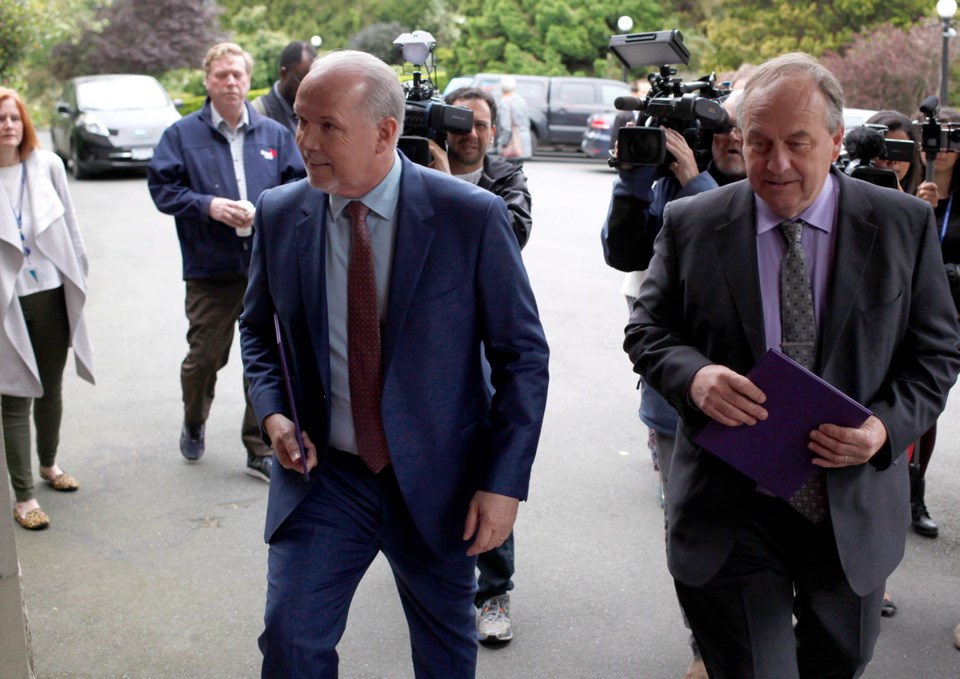On May 9, B.C.’s voters delivered something close to a legislative deadlock, electing 43 B.C. Liberal, 41 NDP and three Green MLAs.
The arithmetic produces a nearly intractable problem. Governments cannot function when every vote in the legislature is a tie. But while an impasse in these highly unusual circumstances is entirely possible, it’s not inevitable. With some creativity and a bit of political courage, there’s a pathway forward that avoids an early election. The public interest in stable government requires it.
A refresher on the numbers. As everyone knows, the B.C. Liberals won the most seats but not a majority. That plurality gives Christy Clark the right to try to form a government, but she cannot control the house without help from the MLAs of other parties.
Green Party Leader Andrew Weaver has publicly committed to joining with the NDP to vote against the government at the earliest possible opportunity on a vote of non-confidence following the throne speech in the first few days of the new legislative assembly. If nothing happens to upset that plan, it’s only a matter of days before the Clark government falls.
On the other side of the house, for weeks now, we’ve known about the agreement between NDP Leader John Horgan and Weaver. Many were originally seduced into thinking that the arithmetic might work: 44 to 43. But it doesn’t. That’s because once the NDP puts up a Speaker, there’s a tie in the house, and that’s even before the appointment of a deputy speaker.
No one now seriously suggests that a B.C. Liberal MLA elected as Speaker at the opening of the legislative session is obliged to continue to serve an NDP-controlled legislature. Of course, there have been situations in which opposition MLAs and MPs have served as Speaker, but none, so far as I’m aware, when the reason is to prevent a deadlock in the house.
The prospect of a Speaker routinely breaking a tie in the house is fundamentally at odds with the Speaker’s role as a non-partisan neutral whose job is to preside impartially and fairly over the legislative assembly.
The Speaker’s impartiality is a fundamental pillar of our system of government. Centuries of tradition and practice guide how a Speaker should vote to break a tie. While it is clearly established that the Speaker should not cast a deciding vote to bring a government down on a vote of non-confidence, a Speaker also ought not to vote to create a majority on ordinary legislation. The Speaker is expected to be removed from the partisan fray, not take sides in it.
The result is that the NDP-Green agreement is a recipe for stalemate. That’s hardly a situation that will give the lieutenant governor confidence that Horgan should be given an opportunity to become premier. This makes an early election almost inevitable. But that can’t have been Weaver’s intention, and it doesn’t have to happen.
The NDP-Green agreement does not commit the Greens to vote against the B.C. Liberals’ throne speech. It comes into effect only if the NDP forms the government. What commits Weaver to voting against the throne speech is only his stated intention to do so, but those statements might well have been made without fully realizing that this is almost bound to produce, not an NDP government, but an election.
The first move needs to come from the B.C. Liberals. The Green Party has long advocated for electoral reform. This was also part of the B.C. Liberal agenda, first in 2001 and then again in 2005. What if B.C. Liberals committed again to electoral reform? And not just a throne speech promise, but a bill tabled in the legislature that puts the promise within reach, requiring only debate and a vote in the house. In other words, in practical terms, it could be only a few weeks away from being a reality.
Perhaps campaign-finance reform — ending union and corporate donations — is another issue that could be advanced in the same way. There might be others. For example, the Greens want reforms to lobbyist regulation. Other issues — pipelines, Site C — will be more difficult. But in such circumstances, what possible justification exists for the Green Party to trade the certainty of achieving these critically important policy goals, for the uncertainty of an election the public does not want?
One can imagine the challenge this presents for Weaver. But it’s not necessary for the Green caucus to vote for or against the throne speech. All that is required is for two of them to abstain, and thereafter to hold the B.C. Liberals’ feet to the fire, and for both parties to make the compromises necessary to make minority government workable.
In my view, voters would applaud Weaver for having the courage to embark upon this course. If, however, he is seen — and he will be — as the reason for a summer election, voters might not be so forgiving.
Geoff Plant served as B.C. attorney-general and minister responsible for treaty negotiations from 2001 to 2005.



